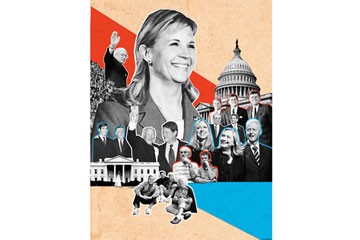
(3 of 4)
Heredity can act as a handy shortcut around the high barriers to entry of the modern campaign. The financial costs of running a ground operation, hiring consultants and airing television ads have skyrocketed. The increasingly celebritized nature of politics has turned politicians' families into stories in their own right. And the advantage of name recognition may be surpassed only by the political networks of high-powered supporters that come with it. There is also the advantage of experience. These candidates start young, dragged to county fairs and Fourth of July parades from their earliest years, and grow up knocking on doors and passing out yard signs. "From someone who had to walk in my first parade at 4 and had to go door to door with my mother, you either completely embrace it or completely shy away from it," said Wyoming-based political consultant Bill Novotny III, the son of a county clerk.
The result is a quantifiable advantage for the group of candidates that the late columnist Stewart Alsop branded "the people's dukes" in 1962. Political scientists have found that a legislator who has served for more than one term is 70% more likely to have another relative enter Congress in the future than other Americans. A 2007 study by researchers for the National Bureau of Economic Research that examined political dynasties since 1789 even found a causal relationship between longevity of service and the creation of a political dynasty. "In politics, power begets power," the authors wrote. And the more power a lawmaker attains, the more likely he or she is to pass it on to relatives. Harvard researcher Brian D. Feinstein wrote in 2010 that the children of prior candidates see a substantial electoral advantage--0.72 to 7.90 percentage points--in open-seat contests and achieve greater likability ratings than nonlegacy candidates.
The numbers also show that the American dynastic tradition is resurgent. In 1790 a high of 24.2% of members of Congress had a close relative who served, a figure that declined to a low of only 5% in 1960, according to a 1969 study in the Journal of Politics. But that figure has risen. In recent years, roughly 1 in 10 members of Congress has had a close relative who has served in the Capitol, a figure that expands drastically when state positions are factored in. In the current 113th Congress, 31 of 435 members of the House are listed in the Biographical Directory of the United States Congress as having relatives who were also members of Congress. In the Senate, at least 25 members have some political family history. New Jersey Republican Representative Rodney Frelinghuysen is a descendant of a line of public servants going back to the Continental Congress in 1779 that has produced four Senators and two House members.
Foot in the Door
In the heavily Republican Cowboy State, politics has long flowed through bloodlines. For decades after statehood in 1890, a few dozen political families controlled Wyoming politics. The current governor, Matt Mead, is the grandson of former governor and Senator Clifford Hansen. Former Senator Alan Simpson's father served as governor and Senator, and both his brother and son were members of the state legislature.
